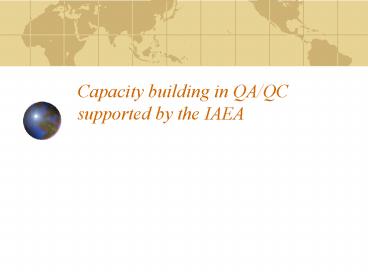Capacity building in QA/QC supported by the IAEA
1 / 20
Title:
Capacity building in QA/QC supported by the IAEA
Description:
Export certificates and Import control of food products. Nuclear forensics ... South Korea, Malaysia, Mongolia, Pakistan, Philippines, Sri Lanka, Thailand, Vietnam ... –
Number of Views:31
Avg rating:3.0/5.0
Title: Capacity building in QA/QC supported by the IAEA
1
Capacity building in QA/QC supported by the IAEA
2
WHY in Nuclear Analytical Laboratories ?
- Results of measurements related to nuclear
measurements or activities should be above any
doubtResponsibility to society - Sustainability- Preservation of expertise-
Market-oriented activities - Added value to IAEAs investments- CRPs and
TCs compliance with deadlines, better
comparability- Sustainability- Development of
reference materials
3
WHY in Nuclear Analytical Laboratories ?
- NEUTRON ACTIVATION ANALYSIS
- Role in metrology in chemical measurements -
Method validation of other techniques -
Contribution to development of reference
materials - Primary ratio method, serving
national metrology institutes in
key-comparisons of the BIPM - (Nuclear) forensics
- NUCLEAR SPECTROCOPY
- Export certificates and Import control of food
products - Nuclear forensics
4
Need for Quality in Nuclear Spectroscopy
Impact of Measurement Uncertainty
Known world Pu amount ca. 700 tons If the
uncertainty in Pu determinations is about 0.1
0.1 700 kg 100 weapons Pu can
disappear because of the uncertainty in
measurement .
5
- Target Institutions
- Radiochemistry and Nuclear Analytical
Laboratories (governmental and private
industries) - Relevant Standards
- ISO/IEC 170251999 and ISO 90002000
- Implementation Mechanisms
- Distribution of documents, TECDOCs etc.
- Training courses
- Technical Co-operation Projects (national and
regional)
6
Recent and running TC project on QA/QC
Region Project Duration Countries involved
Latin America RLA/4/013 RLA/2/011 1997-1999 2003-2005 Argentina, Bolivia, Brazil, Chile, Colombia, Costa Rica, Cuba, Dominican Republic, Ecuador, El Salvador, Guatamala, Mexico, Paraguay, Peru, Uruguay, Venezuela
Europe RER/2/004 1999-2002 Armenia, Belarus, Croatia, Estonia, Hungary, Latvia, Poland, Romania, Slovakia, Slovenia, Turkey
East Asia RAS/2/010 2001-2004 China, Indonesia, South Korea, Malaysia, Mongolia, Pakistan, Philippines, Sri Lanka, Thailand, Vietnam
West Asia RAW/2/005 2003-2005 Iran, Jordan, Kazakhstan, Kuwait, Lebanon, Syria, Uzbekistan, Yemen
Africa RAF/4/0018 2003-2007 Algeria, Burkina Faso, Cameroon, DR Congo, Egypt, Ethiopia, Ghana, Kenya, Libya, Madagascar, Mauritius, Niger, South Africa, Sudan, Tanzania, Tunisia, Uganda, Zambia
7
Agencys additional activities
- Inter-regional Co-ordinated Research Program
Capacity Building for the Development of
Reference Materials and Organization of
Proficiency Testing
8
QA/QC project principles
- Based on ISO/IEC 17025
- Customer service oriented
- Implementation of a complete quality system
- Assist MS laboratories to prepare for national
accreditation
9
Implementation Mechanisms
- 3 4 Training Courses on ISO requirements
- Progress reports every 6 month, evaluated and
rated - 2 audit inspections with rated reports and
feedback - 2 proficiency tests with reports and follow up
discussions - Fellowships and Scientific visits
- Supply of supporting materials, calibration
sources, standards, etc. - Provision of additional expert services
- Financial support for national accreditation
procedure (technical assessor for accreditation
audit)
10
Requirements from participants
- Provision of service analysis using NATs
- Management commitment
- Ability to devote effort on quality system
implementation - Submit a progress report every 6 month
- Participate in all training events
11
Agencys support
- Provision of supporting documents
- Organization of training courses
- Organization of external auditor visits
- Provide financial resources
- Arrange for fellowships and Scientific Visits
- Provision of required consumables
12
Criteria for project evaluation
- Progress reports
- Audit visits
- Proficiency test
13
European project
No. of PARTICIPANTS
7
7
7
7
6
6
6
6
5
5
5
5
4
4
4
4
3
3
3
3
2
2
2
2
1
1
1
1
0
0
0
0
0
20
40
60
80
100
0
20
40
60
80
100
0
20
40
60
80
100
0
20
40
60
80
100
SCORE
14
East Asia project
15
Audit reports
East Asia project
16
East Asia project
17
East Asia project
18
RAF/4/018 (AFRA IV-9) objectives
- Overall Objective To enhance industrial
competitiveness in African countries through
implementation of quality management schemes
at all levels - Specific objectives
- Objective 1 Establishment of project management
at national and regional level - Objective 2 Establishing/upgrading quality
management schemes at national nuclear
institutions. - Objective 3 Human resources development in
quality management. - Objective 4 To facilitate the provision of
technical support and assistance to national
industry in the field of quality management. - Objective 5 To promote regional cooperation and
mutual assistance in quality management.
19
Nuclear Analytical Laboratories with
Accreditation and Quality Systems
ISO/IEC17025 accreditation
INAA
Nuclear spectroscopy
Quality systems operational / in development
20
CONCLUSIONS
- Participants have made considerable progress in
QA/QC documentation (on average 44 ) - Participants improved in ISO compliance according
to audit on average of 27 - Management requirements were generally well
covered - Technical requirements, such as general,
personnel, environmental conditions,
traceability, and test items were also well
covered - Main difficulties remain with test method
validation, equipment, quality control and
reporting































